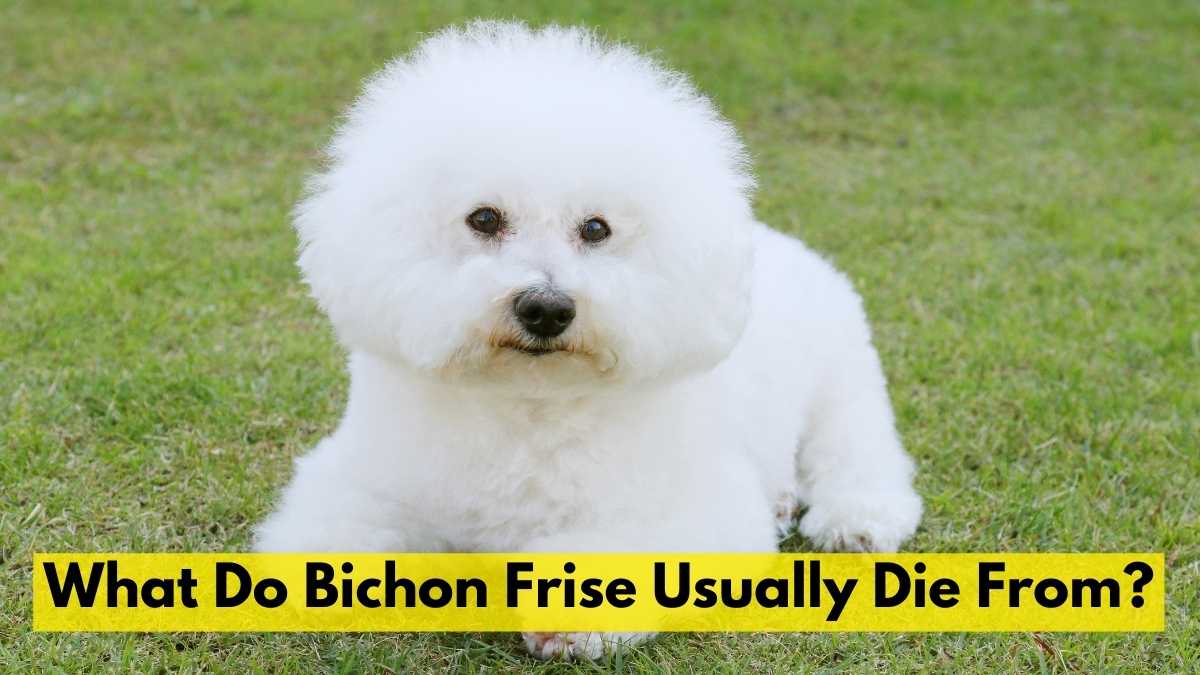The Bichon Frise, a small and charming breed known for its fluffy white coat and affectionate nature, has become a beloved companion to many families worldwide. As pet owners, understanding the common causes of death in Bichon Frise is crucial for providing them with the best care and promoting their well-being. This article aims to shed light on the typical health issues that Bichon Frise dogs may face during their lifetimes, helping owners recognize potential risks and take preventive measures. By exploring age-related ailments, genetic health issues, cancer, and obesity-related complications, we can equip ourselves with knowledge to ensure these delightful pets live longer, healthier lives.
Table of Contents
General Health Considerations
A. Lifespan of Bichon Frise
The lifespan of a Bichon Frise typically ranges from 12 to 15 years, but some dogs may live longer with proper care. Understanding their average lifespan is essential for pet owners to be prepared for the commitment of caring for these adorable companions throughout their lives.
B. Factors Influencing Health and Longevity
Several factors play a crucial role in determining the health and longevity of Bichon Frise dogs. By considering these factors, owners can take proactive steps to ensure their pets lead healthy and happy lives.
1. Diet and Nutrition:
Providing a well-balanced diet with the right nutrients is vital for the overall health of Bichon Frise dogs. A nutritious diet helps maintain a healthy weight, supports their immune system, and prevents certain health issues.
2. Exercise and Mental Stimulation:
Regular exercise and mental stimulation are essential for keeping Bichon Frise dogs physically fit and mentally engaged. Proper exercise helps prevent obesity and maintains healthy joints and muscles.
3. Regular Veterinary Check-ups:
Routine veterinary check-ups enable early detection of potential health problems, allowing for timely intervention and treatment. Regular vaccinations and preventive measures can protect Bichon Frise dogs from various illnesses.
4. Dental Care:
Dental hygiene is crucial for Bichon Frise dogs, as they are prone to dental issues such as plaque buildup and gum disease. Regular teeth brushing and dental check-ups can prevent oral problems and promote overall well-being.
5. Genetic Health Issues:
Bichon Frise dogs may inherit certain genetic health conditions, such as patellar luxation, progressive retinal atrophy (PRA), hip dysplasia, and heart diseases. Responsible breeding practices and genetic screening can help reduce the risk of passing on these issues to offspring.
6. Environmental Factors:
Providing a safe and comfortable environment is essential for Bichon Frise dogs’ overall health. Minimizing exposure to toxins, ensuring a comfortable living space, and avoiding extreme weather conditions are crucial considerations.
Understanding the general health considerations, including the average lifespan and factors influencing health and longevity, is fundamental for providing the best care for Bichon Frise dogs. By focusing on proper nutrition, regular exercise, veterinary check-ups, dental care, responsible breeding, and a safe environment, pet owners can enhance their beloved companions’ quality of life and ensure they enjoy a long and happy journey together.

Common Causes of Death in Bichon Frise
A. Age-related Ailments
1. Canine Cognitive Dysfunction (Dementia):
As Bichon Frise dogs age, they may develop canine cognitive dysfunction, which is akin to dementia in humans. Cognitive decline can lead to memory loss, disorientation, changes in behavior, and a decline in overall cognitive function.
2. Joint Problems and Arthritis:
Bichon Frise dogs are susceptible to joint issues, particularly as they grow older. Arthritis, a common condition in aging dogs, can cause pain, stiffness, and reduced mobility, impacting their quality of life.
3. Dental Issues:
Dental problems, such as periodontal disease and tooth decay, can affect Bichon Frise dogs, leading to discomfort and difficulty eating. Untreated dental issues can have severe consequences for their overall health.
B. Genetic Health Issues
1. Patellar Luxation (Kneecap Dislocation):
Patellar luxation is a condition where the kneecap dislocates from its normal position, causing pain and lameness. It is a common hereditary issue in Bichon Frise dogs.
2. Progressive Retinal Atrophy (PRA):
PRA is a degenerative eye disorder that leads to gradual vision loss and can ultimately result in blindness. Bichon Frise dogs can be affected by this genetic condition, impacting their quality of life.
3. Hip Dysplasia:
Hip dysplasia is a hereditary condition where the hip joint doesn’t develop correctly, leading to pain and difficulty in movement.
4. Heart Conditions (e.g., Mitral Valve Disease):
Bichon Frise dogs may be prone to certain heart conditions, such as mitral valve disease, which affects the functioning of the heart valves and can lead to heart failure.
C. Cancer
1. Common Types of Cancer in Bichon Frise:
Bichon Frise dogs are susceptible to various types of cancer, including skin tumors, mammary tumors, and lymphoma.
2. Risk Factors and Prevention:
Understanding the risk factors associated with cancer can help in early detection and prevention. Regular veterinary check-ups and awareness of potential signs are essential for timely intervention.
D. Obesity-related Complications
1. Impact of Obesity on Bichon Frise Health:
Obesity can lead to numerous health issues in Bichon Frise dogs, including joint problems, heart disease, respiratory difficulties, and a reduced lifespan.
2. Importance of a Balanced Diet and Exercise:
Maintaining a healthy weight through a balanced diet and regular exercise is crucial for preventing obesity-related complications and promoting overall well-being.
By being aware of these common causes of death in Bichon Frise dogs, pet owners can take proactive steps to ensure early detection, timely intervention, and preventive care, thus maximizing the health and longevity of their cherished companions.
Preventive Measures and Care
A. Regular Veterinary Check-ups
Regular veterinary check-ups are vital for maintaining the health and well-being of Bichon Frise dogs. These check-ups should occur at least once a year, or as recommended by the veterinarian. During these visits, the vet can assess the dog’s overall health, provide necessary vaccinations, and perform routine screenings to detect any potential health issues early on.
B. Proper Nutrition and Weight Management
Feeding Bichon Frise dogs a balanced and nutritious diet is essential for their overall health. Owners should opt for high-quality dog food that meets their specific nutritional needs and is appropriate for their age and activity level. Proper portion control is crucial to prevent overeating and obesity. Regularly monitoring the dog’s weight and adjusting the diet accordingly can help maintain a healthy weight and prevent obesity-related complications.
C. Exercise and Mental Stimulation
Regular exercise is essential for keeping Bichon Frise dogs physically fit and mentally stimulated. Daily walks, playtime, and interactive toys can help prevent weight gain, strengthen muscles, and maintain joint health. Mental stimulation through puzzle toys, training sessions, and engaging activities is equally important to keep their minds sharp and prevent boredom.
D. Dental Care
Dental hygiene is crucial for the overall health of Bichon Frise dogs, as dental issues can lead to serious health problems. Regular teeth brushing with canine toothpaste, dental chews, and dental check-ups are necessary to prevent plaque buildup, gum disease, and tooth decay. Good dental care promotes fresh breath and reduces the risk of infections spreading to other organs.
E. Genetic Screening and Responsible Breeding
To reduce the risk of genetic health issues in Bichon Frise dogs, responsible breeding practices are essential. Reputable breeders conduct genetic screenings to identify potential health conditions before breeding. Prospective buyers should inquire about the health history of the puppy’s parents and ensure they come from reputable breeders who prioritize the health and well-being of their dogs.
By incorporating these preventive measures and providing proper care, Bichon Frise owners can significantly enhance the health and longevity of their furry companions. Regular veterinary check-ups, a balanced diet, regular exercise, dental care, and responsible breeding practices all contribute to a happier and healthier life for these adorable dogs.

Conclusion
A. Recapitulation of Common Causes of Death in Bichon Frise
In conclusion, Bichon Frise dogs are susceptible to various health issues that can significantly impact their lifespan. Common causes of death in this beloved breed include age-related ailments such as canine cognitive dysfunction, joint problems, and dental issues. Genetic health issues like patellar luxation, progressive retinal atrophy, hip dysplasia, and heart conditions also pose significant risks. Additionally, cancer and obesity-related complications can lead to severe health consequences if not addressed promptly.
B. Emphasize the Significance of Preventive Care
Understanding the potential health risks and taking preventive measures is of paramount importance in caring for Bichon Frise dogs. Regular veterinary check-ups, proper nutrition, exercise, mental stimulation, dental care, and responsible breeding practices are all crucial aspects of preventive care. Early detection and intervention can make a substantial difference in the well-being and longevity of these adorable companions.
C. Final Thoughts on Promoting the Well-being and Longevity of Bichon Frise Dogs
As responsible pet owners, it is our duty to ensure that our Bichon Frise dogs lead happy and healthy lives. By providing them with a loving home, a balanced diet, regular exercise, and mental stimulation, we can enhance their overall well-being. Regular veterinary check-ups and dental care should never be overlooked, as they play significant roles in preventing and detecting potential health issues. Additionally, supporting responsible breeding practices and genetic screening can contribute to reducing the risk of inherited health conditions.
With proper care and attention, Bichon Frise dogs can thrive and bring joy to our lives for many years. Let us cherish these wonderful companions and do our utmost to promote their longevity and happiness.
You May Also Like:
Why Does My Dog Lick Me in the Morning? Find Out Here

